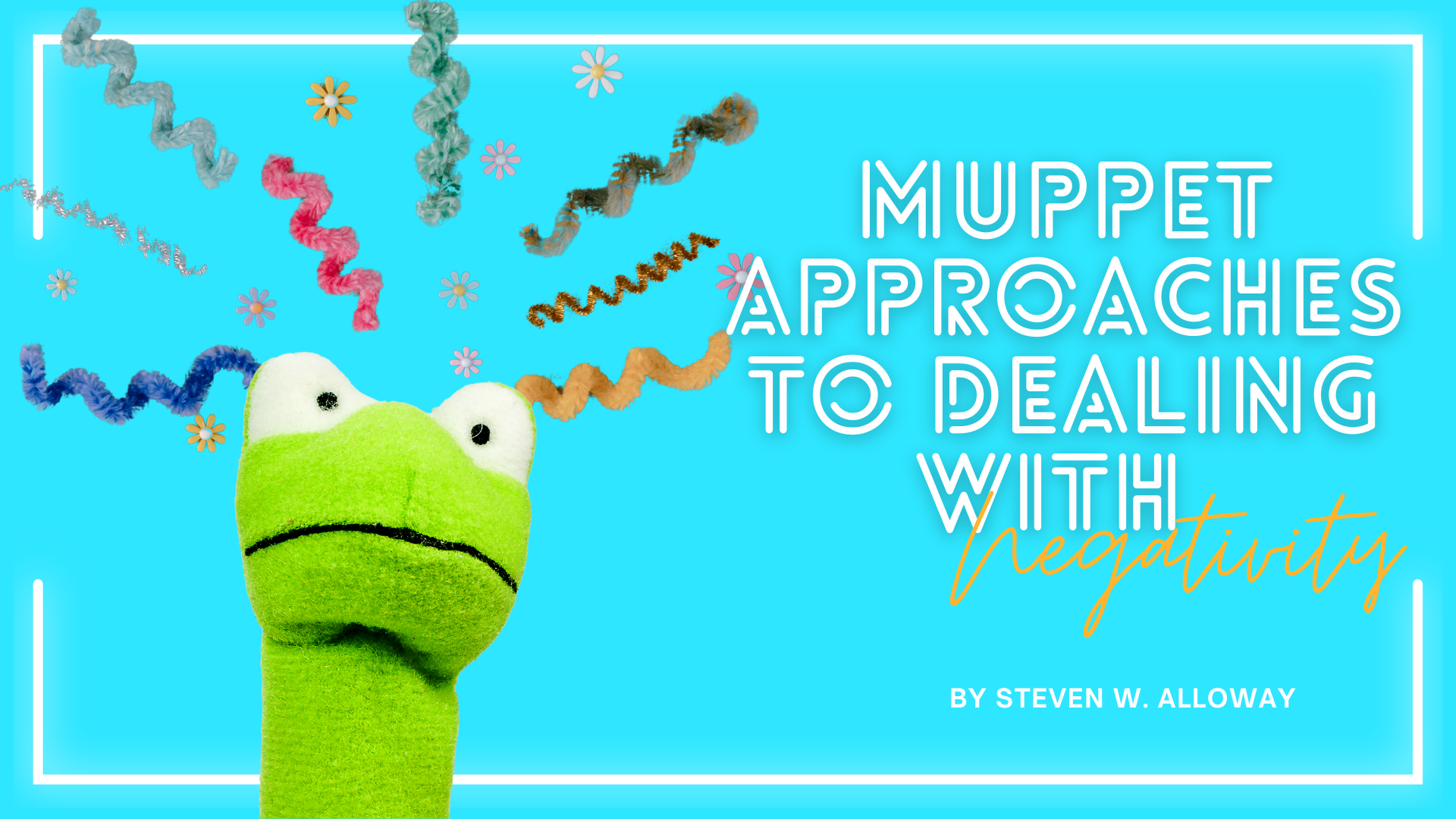Article
Muppet Approaches to Dealing with Negativity
Muppet Approaches to Dealing with Negativity
By Steven W. Alloway

We’ve all dealt with it before: you pour your heart and soul into your art, you put it out there into the world… and the world doesn’t like it. Someone writes a negative review. Someone lists all the things they thought were wrong with what you did and what you should have done instead. Someone boos or heckles you in the middle of a performance. What do you do? How do you handle it?
If you know me, you know I’m a big fan of the Muppets. Even if you don’t know me, you might have guessed at this by reading my Spark articles, wherein I frequently make reference to puppet projects I’ve done, am doing, or have plans to do, occasionally even mentioning how they’re not quite up to the standard of “my hero, Jim Henson.”
So yeah, I’m a big Muppet fan. I grew up watching them, from
Sesame Street to
The Muppet Show to the various Muppet movies to that
Little Caesar’s commercial with the singing uvula. (I’m not sure if that last one was actually made by the Jim Henson Company, but it’s very Muppet-esque.) And they continue to be a source of both entertainment and inspiration for me now, in my adulthood.
What does this have to do with negative reactions to your art? Well, many of the Muppet characters are artists, and much of their content is about being an artist and making art. The format of
The Muppet Show is a variety show—but it’s also about the characters who perform in that variety show, who put together strange and silly acts, week after week, to put before an audience. And in doing so, they frequently get negative reactions.
So, how do they deal with those negative reactions? Different Muppets handle negativity differently. And I think that examining some of those ways of dealing with negativity can be helpful to us in our own creative journeys.
Gonzo
Gonzo the Great is the “resident artist” of
The Muppet Show. His work can best be described as both avant-garde and death-defying. The acts he performs involve things like cannonballs and high dives, but it’s not just circus acrobatics. It’s meant to be performance art. Most of the time, his acts don’t make a lot of sense. As such, when Gonzo goes onstage to
eat a rubber tire to the music of “The Flight of the Bumblebee,” he gets booed. Quite a lot.
But Gonzo is resilient. He doesn’t care what the audience thinks. If they don’t like what he does, it’s just because they’re a bunch of uncultured yokels who can’t recognize great art. His act isn’t for them. Really, it’s for himself, to push the boundaries of his art in new directions—whether or not anyone else understands what directions those are.
There are times when I wish I could be more like Gonzo and just let criticism and negativity slide off my back, not worrying about anything but the art I’m making. As artists, this is often treated as the ideal: the Broadway director who never reads reviews, the Hollywood actor who’s not on social media and never hears all the nasty comments people are posting about them…It sounds like a pretty great way to go through life. It’s also easier said than done.
Plus, it’s important to remember that you can’t create in a vacuum. It’s true that not all art is intended for all audiences, but if you automatically dismiss any negative opinions with “They just don’t understand it,” or “They don’t know what they’re talking about,” then how will you ever grow or evolve as an artist?
The trick is being able to recognize which criticisms come from a place of understanding and which come from a place of not understanding. How do you do that? Well, that’s a topic for another Spark article. For now, we’re talking about Muppets.
Fozzie
Fozzie is the comedian. He has a million jokes and close to a hundred laughs. All the bad jokes, the dumb jokes, the corny jokes… Those are Fozzie’s bread and butter. On
Muppet Babies, whenever Fozzie would tell a terrible joke, people would throw tomatoes at him. On
The Muppet Show he just gets heckled by Statler and Waldorf, the two old men who sit in the balcony and… well, heckle. They have snide comments for everyone, but against Fozzie, they’re particularly merciless. Most other acts, they’ll at least wait until it’s finished before offering their commentary. Fozzie, they interrupt to tell him he’s bad.
But does Fozzie let their heckling get him down? Does he get discouraged when his jokes fall flat? Does he despair when his act doesn’t get any laughs?
Yes. He absolutely does. He hates the criticism. He often complains about it to Kermit backstage. There are episodes when he’s afraid to go out onstage, because he knows what’s coming.
But you know what? He goes out onstage anyway. Week after week, in spite of every setback, he still goes out there and does his act. Always with the hope that this time might be the time he knocks ‘em dead.
Fozzie isn’t afraid to try new things, either. Or rather, sometimes he IS afraid, but he does them anyway. Like when Scooter suggests that they team up to do “the old Telephone Pole Bit.” Fozzie is skeptical, but he agrees, without actually knowing what the old Telephone Pole Bit is. Then, when he finally finds out—and it turns out to be
nothing like what he thought it was—he’s terrified, he’s outraged, and he absolutely refuses to go out onstage. And then he goes onstage.
Or the time he decided to try his hand at being the show’s writer, only to give Kermit a script that’s
riddled with typos. Throughout the episode, Fozzie’s writing causes problem after problem for the show. But he keeps going.
I think Fozzie is most in line with my own approach to creative setbacks. I wish I could have the resilience to let it slide off my back. To do my own thing regardless of what anyone else thinks. But I don’t. It’s discouraging to put your heart and soul into a project, only to have everything go wrong. Or to have it be panned by the audience—or to have no audience at all. Yeah, there are days when I wonder why I even keep doing this.
And then I keep doing this. Because even though last time may have been bad, there’s always the hope that next time will be better. That’s what keeps me going. And I’m pretty sure that’s what keeps Fozzie going, too.
Miss Piggy
When people are mean to Miss Piggy or do or say things she doesn’t like, she karate chops them. Legally and ethically, I cannot actually recommend this as a way to deal with negative criticism, but if that’s what works for you, then have at it.
Kermit
Kermit’s a little different. He’s not usually a solo performer like Gonzo and Fozzie.
Except on special occasions, there’s not usually a section of the show that’s “Kermit’s act.” Instead, the whole show is Kermit’s. He’s the captain of the ship and the glue that holds it all together—even when it’s all coming unglued.
That means whenever there’s a problem with one of those individual acts, it automatically becomes Kermit’s problem, too. When Gonzo or Fozzie or Miss Piggy or whoever else has a bad night, whom do they look to for help? Kermit.
It’s Kermit’s job to fix things when they go wrong. But more importantly, it’s Kermit’s job to keep his performers happy. When they come to him with an issue, it’s his job to help them resolve it. When they come to him with a demand, it’s his job either to figure out how to meet it (even when it’s impossible) or convince them that they don’t need it after all.
Of course, he doesn’t do it alone. Often, other members of the cast, or even the guest star, will come together to offer ideas or encouragement and help sort things out. Kermit keeps everyone together, but through his leadership, they’re all able to keep each other together.
And remember, Kermit’s also the one who gives Gonzo and Fozzie and Piggy, and the others a place on that stage, even when they bomb, and bomb, and bomb again (not that Miss Piggy would ever bomb, of course). They may not always be popular or well-received, but they’re family. It’s Kermit’s job to put on a great show, week after week. But his chief responsibility isn’t to the audience. It’s to the cast. Because he knows that, despite the setbacks, despite what the audience thinks, they’re the ones who make it a great show.
As a director and co-runner of a theater group, this is something I know a bit about. I’ve been the one everyone turns to when things are going wrong. I’m not a natural at it like Kermit is, but I do the best I can. And let me tell you, it’s a lot easier to deal with when you have the right people around.
I’ve told the story before about the professor who told me, “You always want to have the best possible people for any project,” and how I don’t entirely agree. I’d rather have the right people, the people who fit in with my group’s dynamic, the people who I enjoy working with, than the so-called “best people.”
And I genuinely think that doing things that way makes for a better show. There are problems, sure, and discouragement. But we deal with it together. Like with the Muppets, there’s plenty of chaos and insanity throughout any show I do. But also like the Muppets, that’s part of what makes us who we are, and I wouldn’t have it any other way.




